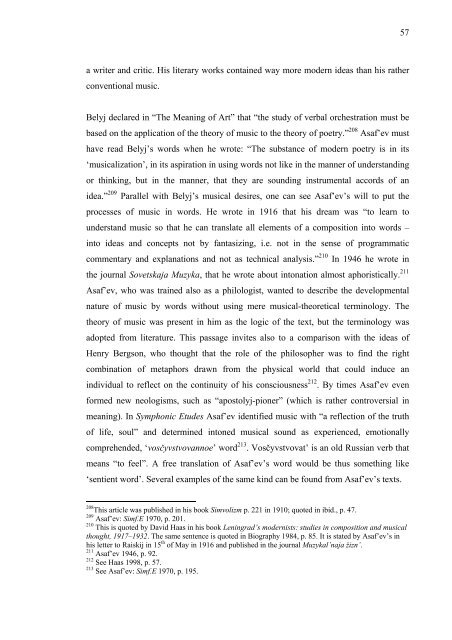Boris Asaf'ev and the Soviet Musicology - E-thesis
Boris Asaf'ev and the Soviet Musicology - E-thesis
Boris Asaf'ev and the Soviet Musicology - E-thesis
You also want an ePaper? Increase the reach of your titles
YUMPU automatically turns print PDFs into web optimized ePapers that Google loves.
a writer <strong>and</strong> critic. His literary works contained way more modern ideas than his ra<strong>the</strong>r<br />
conventional music.<br />
Belyj declared in “The Meaning of Art” that “<strong>the</strong> study of verbal orchestration must be<br />
based on <strong>the</strong> application of <strong>the</strong> <strong>the</strong>ory of music to <strong>the</strong> <strong>the</strong>ory of poetry.” 208 Asaf’ev must<br />
have read Belyj’s words when he wrote: “The substance of modern poetry is in its<br />
‘musicalization’, in its aspiration in using words not like in <strong>the</strong> manner of underst<strong>and</strong>ing<br />
or thinking, but in <strong>the</strong> manner, that <strong>the</strong>y are sounding instrumental accords of an<br />
idea.” 209 Parallel with Belyj’s musical desires, one can see Asaf’ev’s will to put <strong>the</strong><br />
processes of music in words. He wrote in 1916 that his dream was “to learn to<br />
underst<strong>and</strong> music so that he can translate all elements of a composition into words –<br />
into ideas <strong>and</strong> concepts not by fantasizing, i.e. not in <strong>the</strong> sense of programmatic<br />
commentary <strong>and</strong> explanations <strong>and</strong> not as technical analysis.” 210 In 1946 he wrote in<br />
<strong>the</strong> journal Sovetskaja Muzyka, that he wrote about intonation almost aphoristically. 211<br />
Asaf’ev, who was trained also as a philologist, wanted to describe <strong>the</strong> developmental<br />
nature of music by words without using mere musical-<strong>the</strong>oretical terminology. The<br />
<strong>the</strong>ory of music was present in him as <strong>the</strong> logic of <strong>the</strong> text, but <strong>the</strong> terminology was<br />
adopted from literature. This passage invites also to a comparison with <strong>the</strong> ideas of<br />
Henry Bergson, who thought that <strong>the</strong> role of <strong>the</strong> philosopher was to find <strong>the</strong> right<br />
combination of metaphors drawn from <strong>the</strong> physical world that could induce an<br />
individual to reflect on <strong>the</strong> continuity of his consciousness 212 . By times Asaf’ev even<br />
formed new neologisms, such as “apostolyj-pioner” (which is ra<strong>the</strong>r controversial in<br />
meaning). In Symphonic Etudes Asaf’ev identified music with “a reflection of <strong>the</strong> truth<br />
of life, soul” <strong>and</strong> determined intoned musical sound as experienced, emotionally<br />
comprehended, ‘vosčyvstvovannoe’ word 213 . Vosčyvstvovat’ is an old Russian verb that<br />
means “to feel”. A free translation of Asaf’ev’s word would be thus something like<br />
‘sentient word’. Several examples of <strong>the</strong> same kind can be found from Asaf’ev’s texts.<br />
208<br />
This article was published in his book Simvolizm p. 221 in 1910; quoted in ibid., p. 47.<br />
209<br />
Asaf’ev: Simf.E 1970, p. 201.<br />
210<br />
This is quoted by David Haas in his book Leningrad’s modernists: studies in composition <strong>and</strong> musical<br />
thought, 1917–1932. The same sentence is quoted in Biography 1984, p. 85. It is stated by Asaf’ev’s in<br />
his letter to Raiskij in 15 th of May in 1916 <strong>and</strong> published in <strong>the</strong> journal Muzykal’naja žizn’.<br />
211<br />
Asaf’ev 1946, p. 92.<br />
212 See Haas 1998, p. 57.<br />
213 See Asaf’ev: Simf.E 1970, p. 195.<br />
57

















